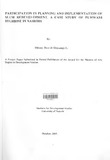| dc.description.abstract | 'The focus of this study was to inquire the levels of participation of Pumwani community members during Pumwani phase 11 slum redevelopment scheme and whether the issues that emerged thereof were influenced by participation. This paper therefore presents a research on the redevelopment process in slums and whether it promotes effective participation so as to achieve desirable results. Levels and forms of participation were analysed by the study during the conception, planning and implementation stages of the programme.
The NBC which was the developer of the scheme targeted the slum dwellers in Majengo area with an aim of constructing decent and affordable housing for them without demolition of the existing structures before the project was completed and ready for occupation. Motivated by Sectional Properties Act of 1987, NHC adopted High-rise type of housing development to bridge the gap of inadequate decent and affordable housing for low-income households.
For effective analysis of the people's involvement in the project, various socioeconomic characteristics of the residents were considered. The study found out that Majengo area has a long history of commercial sex workers, a trade that has continuously attracted women to the area. Levels of Education of the residents were also analysed visa viz community participation. Further, age, marital status, religion, occupation and skills of the respondents were also analysed accordingly.
The findings herein reveal that the community's level of participation remained minimal at various redevelopment stages where those privileged to participate did so either as individuals, group or both. The limited Community participation was in the forms of; interviews, public barazas and committee meetings. However, rivalry, mistrust and rigidity among various stakeholders undermined the process and principles of participation. Other challenges that faced the programme include; generally low literacy levels, large families, family disputes and unreliable sources of income amongst the Pumwani residents. | en_US |

